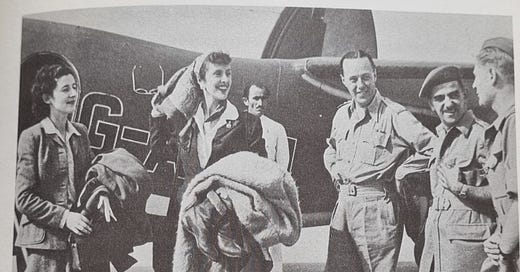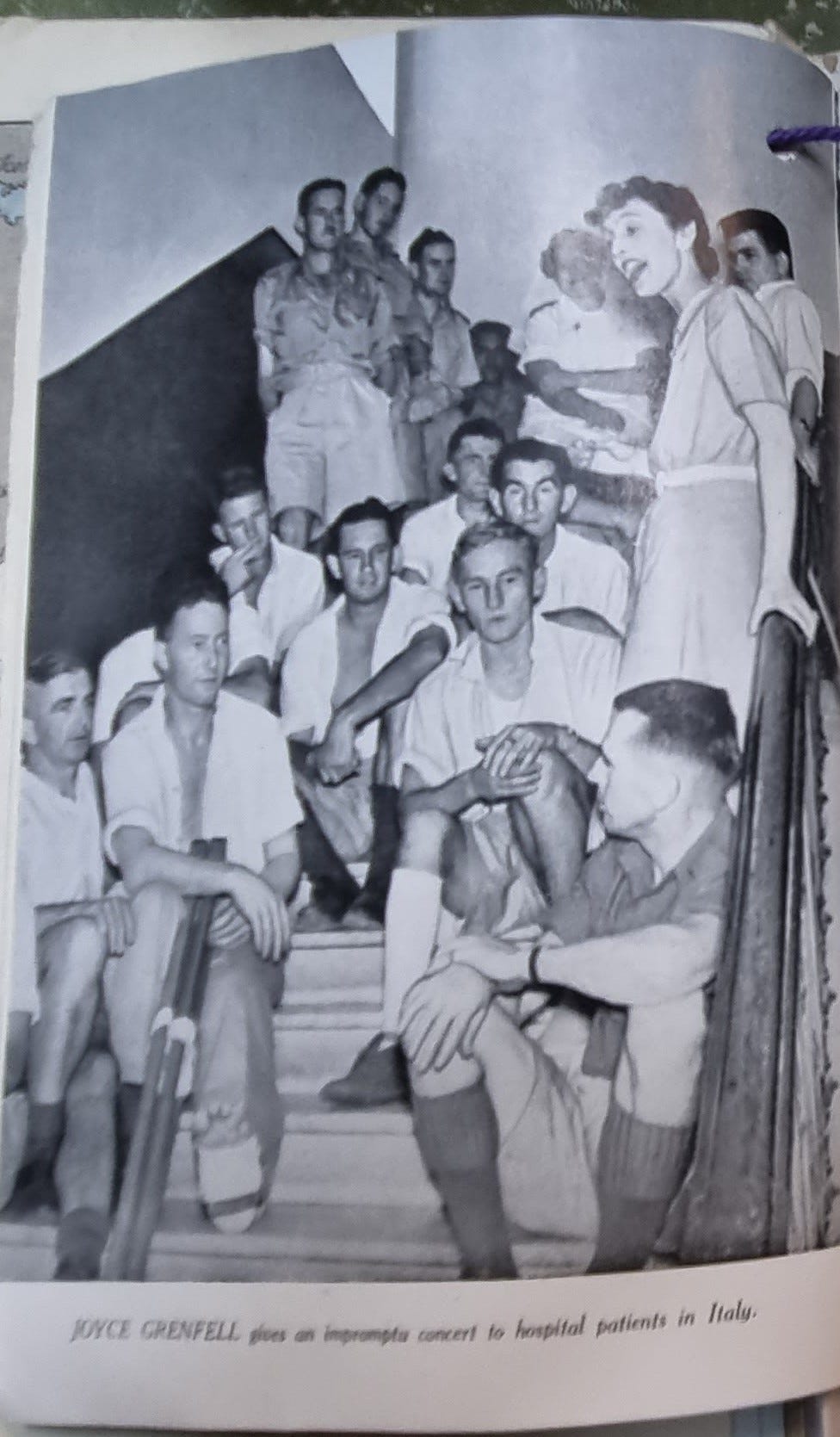Joyce Grenfell Entertaining the Troops in Italy
Taking servicemen out of themselves to re-engage with the world
The history of ENSA (Entertainment National Service Association) during the Second World War is punctuated by a series of remarkable women who got on with their jobs despite the difficulties of working in a war zone and the red tape thrown up by the War Office. One of these women was Joyce Grenfell (1910-79). My previous article looked at Carol Reed’s “The Way Ahead” (1944) and coincidentally, Reed also directed Grenfell’s first film, “The Letter Home” (1941), a story of two children evacuated from war-torn London to America.
Growing up I loved Joyce Grenfell’s monologues, the early St Trinian films where she played the ever enthusiastic police officer, and those immortal words, “George… Don’t Do That”. What I didn’t fully appreciate was her aristocratic background, her strong beliefs as a Christian Scientist, and her tireless work during the war. Grenfell’s mother was from the well-to-do Langhorne family of Virginia and her father was related to the Astors of Cliveden.[1] As the BBC documentary, “Joyce Grenfell: Comedy with Breeding” mentions, she was of blue blooded heritage.[2] It’s ironic that it was Lady Astor’s remarks about ‘D-Day Dodgers’ that resulted in so many distinctly browned off British soldiers in the autumn of 1944. Despite her aristocratic background, as soon as war broke out, Grenfell volunteered to perform for the troops. In the first few years of the war, she worked at the Canadian hospital built at the Cliveden estate in Buckinghamshire. She described her role as follows:
‘My job was a mixture of welfare - handing out gifts from the Red Cross, writing letters for those who couldn’t - and endless shopping. When petrol allowed (we had coupons from the Red Cross) I took up-patients to the movies and home to large teas at Parr’s. Eve and I sang and played in all the wards in turn.’[3]
Figure 1 Joyce Grenfell Arriving in Baghdad[4]
She joined ENSA in 1943 and after a tour of entertaining American troops in Northern Ireland, at the request of Noel Coward, she agreed to a 10 week tour of the North Africa, Italy, and the Middle East. Grenfell knew that her monologue and singing act didn’t really fit with the more common variety concert parties put on by ENSA, “This is not because I am snooty, exclusive or can’t take competition; it is because the way I work and the material I write is in another key.”[5] So she partnered with a pianist, Viola Tunnard, and focused on entertaining the troops who were being treated in hospitals (see photo below).
Figure 2 Joyce Grenfell Performing to Servicemen in a Hospital in Italy[6]
Her connections with London high-society stood her in good stead when abroad, staying with Harold Macmillan in Algiers and Naples, along with the Duff Coopers. Despite benefiting from a rather better class of accommodation on occasion than many of the other ENSA performers, there was no getting away from the horrors of war. When Grenfell first saw badly maimed men straight from the battlefront, she wondered if ENSA performers were actually doing more harm than good.[7] Additionally, she complained frequently about the lack of help or interest the local entertainment officers showed in supporting the artists in Italy. However, the men appreciated being sang to and the quiet intimacy that Grenfell brought in talking to them and offering to write letters home for those unable to hold a pen. She came to believe that informal meetings with servicemen lifted morale and applied her Christian Science reasoning to bringing the soldier’s out of themselves. She explained,
‘We were there to try and engage the patient’s interest (to entertain in the real meaning of the word) and lead him out of himself and his worries into the outside world, still going on, still there, in spite of the horrors of the war; and to try to help take down self-isolating barriers. That was the point of the job - not just to ‘cheer-up-the-boys’ and fill in time (though that had its uses), but to help in linking up again with a continuing life with changeless values in it.’[8]
Grenfell was 35 years old when she toured Italy during March 1944. She reflects in her memoir that her age enabled the servicemen to think of her a mother, an aunt, a wife, or a girlfriend depending on who they were missing most. It was the sentimental, slow, sad songs that had the most impact on the majority of the troops, so Grenfell developed her repertoire to suit. She reflected, “spirits rose after a nice sentimental wallow.”[9]
After spending time touring Paiforce in the Middle East she returned back to London but returned for a second tour of India later in 1944/45. Grenfell’s time entertaining the troops during the war allowed her, like so many other artists, to hone her performances and provided material for decades after. As Jones wrote in 2012, “the five-and seven-month tours of Joyce Grenfell to the Middle East and India stand as a record of endurance and commitment.”[10]
I will be writing about another remarkable ENSA woman in my next post.
[1] Joyce Grenfell, Joyce Grenfell Requests the Pleasure, First (Macmillan London Limited, 1976).
[2] BBC ‘Comedy with Breeding’ Copyright BBC Cyrmu Wales
[3] Grenfell, p. 151.
[4] Grenfell, p. 197.
[5] Grenfell, p. 184.
[6] fol. 2, London, The National Archives (TNA), T 161/1127.
[7] Eric Taylor, Showbiz Goes to War (Hale, 1992), p. 86.
[8] Grenfell, pp. 187–88.
[9] Grenfell, p. 204.
[10] Professor Edgar Jones, ‘Morale, Psychological Wellbeing of UK Armed Forces and Entertainment: A Report for The British Forces Foundation’ (King’s Centre for Military Health Research, Kings College London, 2012), p. 11 <https://bff.org.uk/wp-content/uploads/2012/02/Morale_Report_BFF_screen.pdf> [accessed 16 April 2024].





